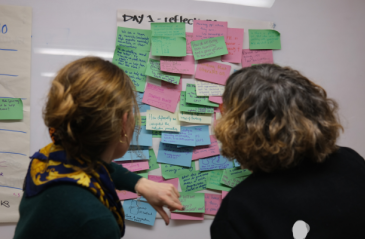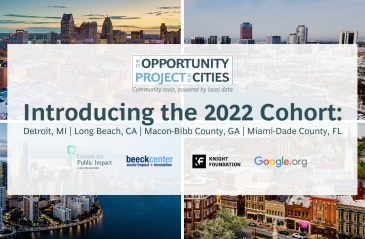
Five things we recently learned about government failure

10,000 start-ups across Africa within the next 10 years is the aim of @TonyElumeluFDN
Share articleEntrepreneurs are key to developing people, countries and Africa, says @TonyOElumelu
Share articleLeaders need to think of how history will judge their legacy, says @TonyOElumelu
Share articleWe put our vision for government into practice through learning partner projects that align with our values and help reimagine government so that it works for everyone.
Tony Elumelu knows a thing or two about public impact. His litany of job titles - financier, businessman, entrepreneur, economist and philanthropist - tells a story of almost unlimited professional accomplishment.
He is highly active in the private sector, investing in key sectors across Africa through his proprietary investment firm, Heirs Holdings, and chairing United Bank for Africa - a Nigerian bank which he turned into a Pan-African institution with operations in 19 countries and 1,000 branches across the continent. And in 2010 he set up The Tony Elumelu Foundation, which is well on its way to creating 10,000 startups across Africa within the next 10 years. Generous of heart, spirit and pocket, Elumelu is now overseeing an extensive network of activity, all geared towards turbo-charging the continent's growth through the power and impact of entrepreneurs.
"It's not about the money you have but about legacy," he says. "I decided to create the Foundation to support young Africans and help make them successful - and I believe entrepreneurs are key to developing people, countries and the continent."
It's important to note that The Tony Elumelu Foundation is not just any charitable endeavour. Rather, it is undertaking tasks - creating jobs and helping entrepreneurs grow and thrive - that normally fall to governments. Elumelu, though, is adamant that entrepreneurs achieve an impact which cascades across society - from the boardroom onwards. This, together with his personal experience and knowledge of the importance of a hand up rather than a handout, means that his foundation is especially committed to empowering young African entrepreneurs to create the jobs that are urgently needed throughout Africa. In his own words, the only way to solve unemployment is to democratise opportunity for job creation. “Corporates and governments alone cannot create the millions of jobs Africa needs. Only SMEs can.
"If we help people become entrepreneurs, they will succeed and then they will help others succeed while collectively tackling the issues that confront us as a people, such as the issue of poverty and the issue of joblessness," he explains. "Small businesses create a multiplier effect where more young people gain employment through the jobs created. This, in essence, is why the Foundation was set up."
The Foundation is underpinned by Elumelu's philosophy of "Africapitalism", which states that long-term, African-led private sector investment in key sectors of the continent's economy will drive economic and social development. Its flagship programme, which was launched in 2015, is a 10-year, US$100 million commitment to identify and empower 10,000 African entrepreneurs, create a million jobs, and add US$10 billion in revenues to Africa's economy.
Each entrepreneur receives seed capital of US$5,000 to support early growth, creating a proof-of-concept, and/or enhancing their business operation. Elumelu is keen to stress, though, that it is about far more than just funding. "We train them for 12 weeks and it is about mentoring, training and creating the network, platform and opportunities they need," he explains. "They get access to me and they get taught the principles of my success. We cover things like starting and scaling a business, business development, marketing strategy, effective management and much more. In return, we want 1,000 entrepreneurs every year, male and female, and from every country in Africa."
The Foundation is - rightly - focused on outcomes, and offers what is clearly a holistic array of activities. However, this also raises the question: are governments still needed? Actually, Elumelu firmly believes that policymakers have a critical role to play, starting by creating the enabling environment for entrepreneurs to succeed.
"Governments need to focus on soft issues - the rule of law, taxation, the ease of starting businesses, and so on," he points out. "These are all things that help entrepreneurs succeed. To this end, at the Foundation we drive advocacy and engage with governments like Nigeria to help drive the country's competitiveness. If we are competitive as a country, then entrepreneurs will succeed - if we are not competitive, then entrepreneurs won't succeed."
He goes on to say that the Foundation has worked with Tony Blair's foundation, the Africa Governance Initiative, to help strengthen the capacity of some African governments - Nigeria, Liberia and Sierra Leone. "We send teams to work with the governments to help them develop the expertise and capacity to negotiate with the rest of the world on issues like public-private partnerships," explains Elumelu. "And as part of our programme, we help connect our entrepreneurs with local hubs and key government agencies."
There is no doubt that the Foundation is doing good and important work - but equally it cannot do it alone. From ensuring that the continent's fast growing numbers of youth find gainful employment to the evolving dynamics between Africa and global economic powers, it is clear that the continent's leaders have no shortage of challenges to respond to and address.
Elumelu admits that the recent announcement of the latest cohort of 1,000 entrepreneurs on 22 March was slightly bittersweet, as about 93,000 African entrepreneurs applied for a place on the programme. “There are 92,000 aspiring entrepreneurs who have been unsuccessful. These young African men and women have demonstrated passion and creativity, and we should not relent until we help them realise their aspirations. I call on other successful Africans, and friends of Africa, to support us to do more.”
And when comparing Africa with South-East Asia - where I am based - it is hard not to be struck by the differences. Although they have similar levels of natural resources, as well as a shared colonial heritage, their trajectories of development have been markedly different. Asked what can be done to accelerate Africa's progress, Elumelu says that it is a shared responsibility involving government and the wider business community.
"Public sector leaders have to overcome the mentality of colonies - they have had political independence, but independence of mind seems to be a problem," he observes. "That's why I advocate for legacy: when leaders ask themselves how they will be remembered and how history will judge them, then they do what is right. We also need to make our leaders accountable. We have long had a culture where we are passive and accept anything that happens, but this is starting to change. Social media is breaking down barriers, and some African leaders are being voted out of office by millennials who are a lot more conscientious, restive and active - so this is a positive."
And the private sector also needs to step up, he adds. "Business leaders need to realise it is in their self-interest to make sure that they don't succeed alone," he says. "True success comes when you're not the only person who everyone depends on, but instead are the catalyst for others becoming self-reliant. There is greater joy in seeing all these happy faces than in seeing fat bank accounts."
Here, he believes that the tide is beginning to turn. Although 20 years ago the continent was enriched by a "golden generation" of leaders led, of course, by the late Nelson Mandela, Elumelu argues that the current crop of leaders are slowly starting to recognise that it is better to work together than go solo. "The people I talk to - the entrepreneurs, the government leaders - are realising that it takes both public and private sectors to make things work, and we need to work together and think long term," he says. "African leaders are gradually getting there by bringing new people into government, so I am optimistic about what lies ahead."
Indeed, optimism is something that evidently runs deeply through his core. After all, it would have been very easy to sit back and enjoy the fruits of his labours.
Elumelu, though, has opted for a more difficult journey, one pockmarked by challenges aplenty but one that also offers the prize of a far stronger continent shimmering on the horizon. And while others may fret about their legacy, he for one need not worry - his place in the history books is already assured.










